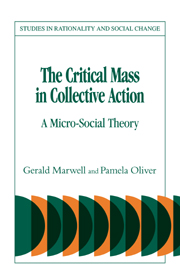Book contents
- Frontmatter
- Contents
- PREFACE
- ACKNOWLEDGMENTS
- 1 The critical mass and the problem of collective action
- 2 Building blocks: goods, groups, and processes
- 3 The paradox of group size
- 4 The dynamics of production functions
- 5 Social networks: density, centralization, and cliques
- 6 Selectivity in social networks
- 7 Reach and selectivity as strategies of recruitment
- 8 Unfinished business
- REFERENCES
- NAME INDEX
- SUBJECT INDEX
3 - The paradox of group size
Published online by Cambridge University Press: 19 March 2010
- Frontmatter
- Contents
- PREFACE
- ACKNOWLEDGMENTS
- 1 The critical mass and the problem of collective action
- 2 Building blocks: goods, groups, and processes
- 3 The paradox of group size
- 4 The dynamics of production functions
- 5 Social networks: density, centralization, and cliques
- 6 Selectivity in social networks
- 7 Reach and selectivity as strategies of recruitment
- 8 Unfinished business
- REFERENCES
- NAME INDEX
- SUBJECT INDEX
Summary
We begin our redefinition of the problem of collective action with what has become an almost classic debate over Mancur Olson's “group-size” thesis. Hardin summarizes the thesis succinctly as “large groups will fail [to provide collective goods]; small groups may succeed” (1982, p. 38). Olson's argument seems to be intuitively compelling for many observers of everyday life and has convinced a large number of scholars, as well. It also articulates well with a major set of research findings in social psychology regarding the “diffusion of responsibility.” These findings suggest that the presence of other people who might also assist someone in need reduces an individual's propensity to help that person (Latane and Nida 1981; Piliavin, Dovidia, Gaetner, and Clark 1981, pp. 120–32).
Applying his argument to our example, Olson would predict that a small group of city employees might be able to obtain the grandfather clause, while a large group of employees would not. In the larger group each employee would hope to free-ride on the efforts of others, so none would act and all would suffer. In the smaller group interpersonal dynamics and the “noticeability” of contributions (addressed later) might overcome the tendency to free-ride.
In contrast to this intuitively appealing prediction stands a significant body of empirical research that argues just the contrary, that is, it finds that the size of a group is positively related to its level of collective action. For example, Spilerman (1970, p. 654) summarized his analysis of the black riots of the 1960s by saying: “The larger the Negro population, the greater the likelihood of the disorder. Nothing else appears to matter.”
- Type
- Chapter
- Information
- The Critical Mass in Collective Action , pp. 38 - 57Publisher: Cambridge University PressPrint publication year: 1993

